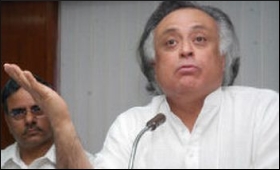|

|
No change in economic policy' trajectory after 1991: Jairam
|
|

|
|
| Top Stories |
 |
|
|
|
SME Times News Bureau | 10 Oct, 2015
Congress leader Jairam Ramesh on
Friday said the course of Indian economic policy after the 1991 reforms
has remained unchanged despite the country being governed by various
parties.
"The trajectory of economic policy has not changed since
the liberalisation period. It has enjoyed political consensus for the
last 25 years," he said at an interactive session organised by Observer
Research Foundation.
The former union minister was providing
insights into his latest book - "To the Brink and Back: India's 1991
Story" - which is a first-hand account of the developments leading to a
series of economic reforms and opening up of the Indian economy.
Then
a bureaucrat in the union finance ministry then headed by Manmohan
Singh under then prime minister P.V. Narasimha Rao in 1991 and
participating extensively in the economic reforms, Ramesh recalled that
when liberalisation - still as a concept - was introduced, it met with
tremendous opposition both from the political and some industrial
circles.
Referring to USSR leader Mikhail Gorbachov's "glasnost
(openness)" and "perestroika (economic restructuring)" policies and the
abortive coup in August 1991, he said at one point of time, the Rao
administration even considered not implementing the economic reforms to
avoid such political unrest in India.
However, after the coup failed and Gorbachev was freed, the government decided to continue the reforms.
Asked
if the then changing scenario in communist East Europe, Soviet Union,
Cuba, and China made India think about opening its economic doors to the
world, Ramesh said: "We were not paying heed to what was going on in
these countries."
He said liberalisation took place as India faced its "gravest economic crisis in 1991".
Ramesh also acknowledged that the International Monetary Fund had been a catalyst in ushering the reforms.
Asked
about the results of the reforms, he said on the industrial and trade
front, the entire series of reforms have been implemented.
"However, over fiscal policy, it is just 30 percent," he said.
"People
used to call it (1991 reforms) LPG - liberalisation, privatisation and
globalisation. While the L and G has continued over these years, P
remains a point of concern," he said answering a question over
implementation and continuity of these policies.
Acknowledging that inequality has gone up post the reforms, Ramesh said poverty has been contained.
"However,
inequality is the result of the failure of public systems - namely
education and health - and not income inequality," he contended.
Ramesh
added although reforms ushered a new epoch in the Indian economy, it
should not depend on foreign direct and institutional investment,
stressing domestic capacity needs to be strengthened to drive growth.
|
|
|
| |
|
|
|
|
|
|
|
|
|
|
|
|
|
|
| |
| Customs Exchange Rates |
| Currency |
Import |
Export |
US Dollar
|
66.20
|
64.50 |
UK Pound
|
87.50
|
84.65 |
Euro
|
78.25
|
75.65 |
| Japanese
Yen |
58.85 |
56.85 |
| As on 13 Aug, 2022 |
|
|
| Daily Poll |
 |
 |
| PM Modi's recent US visit to redefine India-US bilateral relations |
|
|
|
|
|
| Commented Stories |
 |
|
|
|
|
|
| |
|